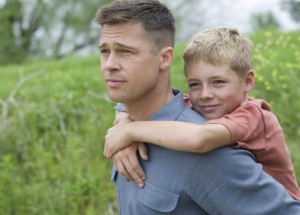‘Tree of Life’ is Lush, Meaningful Mind Journey
The bombardment of summer blockbuster movies can be hot, muggy and overwhelming, with ring-wielding superheroes, talking race-cars and Captain Jack Sparrow keeping plenty of people entertained, if not terribly enlightened. Luckily enough, The Tree of Life can provide some shade in this climate in order to let the more cerebral cinema-goers slow down, take a breath, and partake in a piece by a director who doesn’t often get out in the limelight.
The O’Brien family is your typical 1950s Waco, Texas, clan — father (Brad Pitt), mother (Jessica Chastain) and three rambunctious boys (Hunter McCracken, Laramie Eppler, Tye Sheridan), the oldest of which is Jack. As summer hits their suburban neighborhood, the kids’ unwieldy behavior running around the house and its surrounding area starts to get under the skin of their father, whose stalled career has not left him an easy person to be around. While his mother tries to be more nurturing to her sons, Jack is torn between developing into a young man and keeping his childhood innocence.
Pitt is inscrutable as the complex patriarch, whose first name we never learn, keeping us all the more at arm’s length as he attempts to be a loving father, a disciplinarian, and a success in the business world. While he never manages to be all three at once, his role as the man who hands down punishments is always present, leaving his boys resentful of him and his wife distant.
Chastain is exuberant in a breakthrough performance as the family’s single female member, keeping an aura of rosiness to match her tangerine locks. McCracken leads the way with the trio of first-time actors playing the O’Brien boys, displaying the ideal blend of melancholia and unfettered curiosity about the world around him, going through an Oedipal coming of age without even realizing it. However, this naïveté isn’t something that will last into adulthood, as seen by Sean Penn as an older, miserable Jack, at odds with his father and even less sure about his life.
Uncertainty is the name of the game in Terrence Malick’s latest directorial effort, his fifth full-length feature. For someone who has been in the film game for more than 40 years, this number may seem tiny, but what Malick lacks in quantity on his resume he more than makes up for with quality. Ever since 1973’s Badlands, the filmmaker has been able to evoke the full spectrum of emotions with quiet, pastoral settings and characters that are fully fleshed out in every sense, yet still leaving some sense of mystery in what lies beneath the surface.
While so much can be said just by the facial expressions of his cast, Malick shoots for a much more multifaceted approach in capturing the experience that we call life, starting at the beginning — the very beginning, in fact, with segments giving us a glimpse at the earliest days of the universe and its dinosaur inhabitants. In this vein, the tree of life theory ties modern society to the prehistoric world in showing how the indulgences and occasional clemency of ancient reptiles is unusually akin to humanity. On a grander scale, Douglas Trumbull, the special effects master behind “2001: A Space Odyssey,” brings his wizardry out of retirement to team with cinematographer Emmanuel Lubezki, crafting a series of indescribably beautiful cataclysms, set to the slow, steady score of Alexandre Desplat. However, the snippets of music by Bach, Brahms, Mahler and other classical composers are what really make an impression in the auditory sensation, snapping us back to the present thanks to the O’Brien family turntable.
You don’t hear 19th century music in many films during the summer season, at least not the ones that rake in a lot of cash. The film’s recent win of the Palme d’Or at the Cannes Film Festival must have inspired a lot of confidence to illicit a release in the middle of the year against enormous blockbusters. But, while so many of the movies of summer are simple, fast-paced and easily wrapped up in the final minutes, Malick’s tendency for letting his story just drift off into the sunset works against him. A coda that includes adult Jack’s introspection about his life and the people he loves opens up an unnecessary chapter that takes on the form of “What Dreams May Come” and is roughly just as aimless. It feels like there should have either been more or less material to make this an appropriate length instead of branching out with an incomplete ending.
Like the starburst that keeps reappearing at random intervals in its narrative, The Tree of Life is a lovely, pensive surprise in the midst of blissful summer ignorance. While it may not be perfect, the fruit borne by this tree is one which will hopefully allow future filmmakers to plant its seeds and sow them for a potent new crop.
Rating: 3 out of 4 stars


